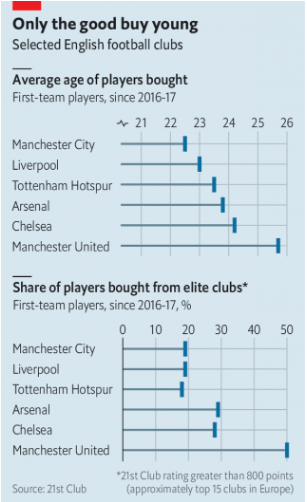Earlier this year we issued our ‘All Immigration is Local’ Report, which sought to unpick the different dynamics of immigration in the UK when viewed from the different perspectives of its perceived national benefits on the one hand, and its perceived local impacts and stresses on the other. We did not discuss football. But if we had done we might have pointed out that similar local/national tensions arise here as well, but are seemingly turned on their head.
Immigration of overseas footballers to English teams has been a huge boost not only to the brand of the English Premier League, but to the local pride of its main teams, both in itself and in the success it has brought them. No fan of Manchester City, Liverpool or Tottenham last season would have been found bemoaning the influx of Aguero, Salah or Son into their local area. Indeed my own personal experience, as a frequent visitor to the terraces at Fulham for a number of seasons now, is that even significantly less stellar overseas talent seems to be a magnet for particular adulation. Supporters who bemoan their foreign stars – Pogba at Manchester United? – generally do so on the basis that their team has signed the wrong foreign star, not that they should have selected local talent instead.
But local gain may bring national pain. Under FA rules the 25-man Premier League team squads currently need reserve only 8 places for home-grown players. Two-thirds of the minutes in the Premier League are now played by overseas players. Four of the England players in their most recent international against Bulgaria have played less than 100 Premier League games. Perhaps unsurprisingly the English FA and the England football manager are concerned that this system is stifling opportunities for English talent to develop at the top level of the game[1].
So whereas outside of football we see local concerns that, exacerbated by the ease of EU freedom of movement, employers have made use of highly mobile and effective overseas labour at the expense of local talent, which has not been invested in and given a chance to develop, in English football we see that same dynamic, but instead causing concerns at the national level. And the interests of local pride and the commercial interests of the Premier League product look increasingly out of kilter, indeed clashing with, the national football interest, in the sense of the development of English talent to support the achievements of the England football team.
But while some aspects of football’s relationship with immigration may look like a world apart, in other respects we are now seeing significant alignment between the football and non-football world. One is the mantra of Brexit ushering in a new era of a level playing field for immigration. The idea that, with the end of EU freedom of movement in the UK, the rules and restrictions for EU immigration going forward should be brought into line with the those for employing non-EU talent, and the consequences this will have for employers.
As in the non-football world, the football world has restrictions on non-EU immigration; essentially this category of player can only be signed if already a recognised international or signed for an above average transfer fee. And the football world has the same concerns that the end of EU freedom of movement will drastically curtail an important labour flow. If the current non-EU rules had been applied to the signing of EU players over the last 25 years, half of those overseas players who came to Premier League clubs would not have been eligible to do so[2].
And just as with immigration more broadly in the Government’s White Paper on ‘The UK’s future skills-based immigration system’, indeed perhaps even more so in the football world, there are signs that Brexit is triggering a more fundamental rethink of the appropriate balance between access to overseas talent and development of local talent, and how to achieve the most productive mix. One potential compromise that has been floated is that if the places reserved for home-grown players in Premier League squads were to be raised from 8 to 12, the FA might be willing (subject of course to Government approval) to abolish eligibility rules for all overseas signings, opening up the ability for Premier League teams for the first time to source younger, cheaper players from outside the EU[3].
What might such a trade-off mean for ‘productivity’? And for the success and attractiveness of the Premier League product? Might such a scenario potentially be a win-win for both the FA and the Premier League? The evidence suggests that, while all still relative in a very expensive world, more recently it has been those clubs that have bought younger and cheaper players and then sought to develop those players further that have prospered most, at the expense of those who have bought more experienced and more expensive players.

Source: ‘Scouts’ honour; How Manchester City came to dominate the Premier League’, The Economist, 16 May 2019 https://www.economist.com/britain/2019/05/16/how-manchester-city-came-to-dominate-the-premier-league.
At the SMF we are always on the look-out for potential win-wins in immigration policy. We think there are more to be found than may readily meet the eye. While Premier League football should not be confused with real life, particularly when it comes to immigration, that does not mean that the immigration tensions, challenges and compromises that play such an important part in English football may not be instructive more broadly. And the fact that, wherever your staff are recruited from, you can build a stronger and more successful organisation by investing in and developing them, may not seem particularly revolutionary but certainly bears reminding.
[1] ‘A deal of two halves: Brexit could mean fewer but better foreign plays in the Premier League’, The Economist, 17 November 2018 https://www.economist.com/britain/2018/11/17/brexit-could-mean-fewer-but-better-foreign-players-in-the-premier-league.
Michael Savage, ‘Football faces Brexit chaos over EU player transfers to UK clubs’, The Guardian, 12 May 2019 https://www.theguardian.com/politics/2019/may/12/football-brexit-chaos-over-eu-player-transfer.
[2] ibid, ‘A deal of two halves’.
[3] ibid.
